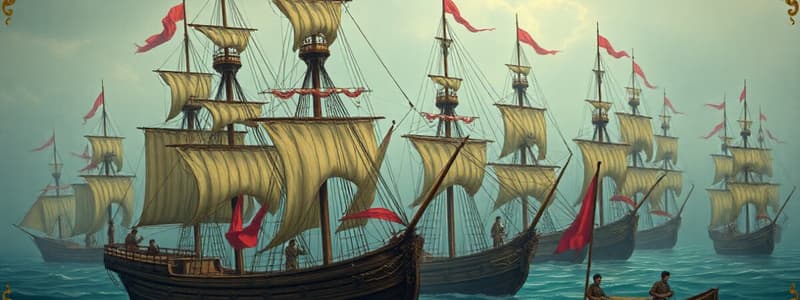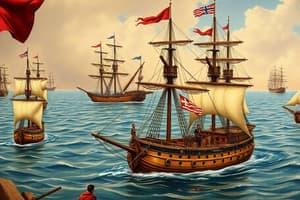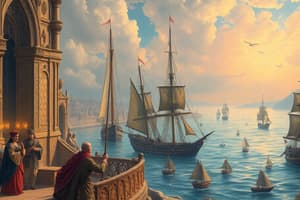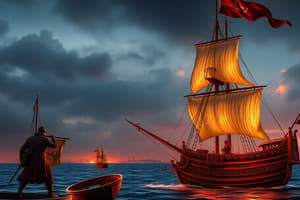Podcast
Questions and Answers
Contrast the strategic implications of naval blockades employed by the fledgling United States Navy during both the First and Second Barbary Wars, considering variations in fleet composition, logistical constraints, and long-term geopolitical objectives.
Contrast the strategic implications of naval blockades employed by the fledgling United States Navy during both the First and Second Barbary Wars, considering variations in fleet composition, logistical constraints, and long-term geopolitical objectives.
During the First Barbary War, the blockade of Tripoli aimed to exert economic pressure and prevent Tripoli's naval forces from operating, supported by limited resources and focused on immediate cessation of tribute demands. In contrast, the Second Barbary War saw a more decisive naval intervention by a strengthened U.S. Navy post-War of 1812, targeting Algiers with the goal of permanently ending tribute and securing broader maritime dominance, reflecting a shift towards longer-term strategic goals.
Analyze the role of technological asymmetry in the Barbary Wars, specifically focusing on naval architecture, gunnery, and signalling capabilities, and evaluate how these disparities influenced tactical outcomes and strategic decisions during key engagements such as the capture of Derna.
Analyze the role of technological asymmetry in the Barbary Wars, specifically focusing on naval architecture, gunnery, and signalling capabilities, and evaluate how these disparities influenced tactical outcomes and strategic decisions during key engagements such as the capture of Derna.
The U.S. Navy's technological superiority in naval architecture (e.g., hull design for speed and maneuverability) and more accurate gunnery provided a distinct advantage over Barbary pirates. While the capture of Derna hinged on land-based operations, naval superiority enabled effective blockade and logistical support for Eaton's forces, highlighting how technological asymmetry could translate into operational success in asymmetric warfare.
Assess the long-term economic impact of the Barbary Wars on transatlantic trade, including shifts in insurance rates, adjustments in merchant shipping routes, and the broader implications for the development of American commercial power relative to European competitors.
Assess the long-term economic impact of the Barbary Wars on transatlantic trade, including shifts in insurance rates, adjustments in merchant shipping routes, and the broader implications for the development of American commercial power relative to European competitors.
The Barbary Wars initially increased insurance rates and disrupted U.S. transatlantic trade, but the successful conclusion of the wars significantly reduced these costs, leading to safer and more reliable shipping routes. This bolstered American commercial competitiveness, fostering trade expansion and facilitating the rise of the U.S. as a major player in international commerce, challenging established European powers.
Evaluate the impact of the Barbary Wars on the development of American national identity and public consciousness, considering the role of propaganda, popular culture, and political rhetoric in shaping perceptions of both the Barbary States and the United States' role in international affairs.
Evaluate the impact of the Barbary Wars on the development of American national identity and public consciousness, considering the role of propaganda, popular culture, and political rhetoric in shaping perceptions of both the Barbary States and the United States' role in international affairs.
Examine the legal and ethical dilemmas faced by the United States government in addressing the issue of ransom and enslavement during the Barbary Wars, taking into account contemporary international law, moral philosophy, and the evolving abolitionist movement within the United States.
Examine the legal and ethical dilemmas faced by the United States government in addressing the issue of ransom and enslavement during the Barbary Wars, taking into account contemporary international law, moral philosophy, and the evolving abolitionist movement within the United States.
Critically assess the influence of Enlightenment ideals on U.S. foreign policy during the Barbary Wars, particularly concerning notions of natural rights, free trade, and the justification for military intervention against perceived 'uncivilized' societies.
Critically assess the influence of Enlightenment ideals on U.S. foreign policy during the Barbary Wars, particularly concerning notions of natural rights, free trade, and the justification for military intervention against perceived 'uncivilized' societies.
Analyze the role of naval logistics and supply chain management in sustaining U.S. military operations during the Barbary Wars, considering the challenges of distance, resource scarcity, and the technological limitations of naval provisioning in the early 19th century.
Analyze the role of naval logistics and supply chain management in sustaining U.S. military operations during the Barbary Wars, considering the challenges of distance, resource scarcity, and the technological limitations of naval provisioning in the early 19th century.
Compare and contrast the diplomatic strategies employed by the United States in resolving the First and Second Barbary Wars, focusing on the use of coercive diplomacy, negotiation tactics, and the evolving understanding of international law and maritime rights.
Compare and contrast the diplomatic strategies employed by the United States in resolving the First and Second Barbary Wars, focusing on the use of coercive diplomacy, negotiation tactics, and the evolving understanding of international law and maritime rights.
Discuss the ramifications of the Barbary Wars on the internal political dynamics of the early United States, examining divisions within the Federalist and Republican parties regarding the use of military force, federal spending, and the balance of power between the executive and legislative branches.
Discuss the ramifications of the Barbary Wars on the internal political dynamics of the early United States, examining divisions within the Federalist and Republican parties regarding the use of military force, federal spending, and the balance of power between the executive and legislative branches.
Analyze the influence of the Barbary Wars on the professionalization of the United States Navy, focusing on changes in naval training, officer corps development, and the adoption of standardized naval doctrine and operational procedures.
Analyze the influence of the Barbary Wars on the professionalization of the United States Navy, focusing on changes in naval training, officer corps development, and the adoption of standardized naval doctrine and operational procedures.
To what extent did the Barbary Wars influence the Monroe Doctrine, particularly with regard to the assertion of American hegemony in the Mediterranean and the projection of U.S. power beyond its immediate sphere of influence?
To what extent did the Barbary Wars influence the Monroe Doctrine, particularly with regard to the assertion of American hegemony in the Mediterranean and the projection of U.S. power beyond its immediate sphere of influence?
Delve into the legal and diplomatic complexities surrounding the status of enslaved Africans within the Barbary States during the wars. How did the U.S. navigate the issue of their potential liberation, and what implications did this have on the burgeoning abolitionist movement at home?
Delve into the legal and diplomatic complexities surrounding the status of enslaved Africans within the Barbary States during the wars. How did the U.S. navigate the issue of their potential liberation, and what implications did this have on the burgeoning abolitionist movement at home?
Elaborate on the role of privateering and naval mercenaries in the Barbary conflicts. How did their involvement blur the lines between legitimate warfare and piracy, and what challenges did this pose to the establishment of international legal norms?
Elaborate on the role of privateering and naval mercenaries in the Barbary conflicts. How did their involvement blur the lines between legitimate warfare and piracy, and what challenges did this pose to the establishment of international legal norms?
Assess the influence of the Barbary Wars on the evolution of American maritime law and legal interpretations of piracy. How did these conflicts shape the definition of piracy under U.S. law, and what implications did this have for subsequent American legal practice?
Assess the influence of the Barbary Wars on the evolution of American maritime law and legal interpretations of piracy. How did these conflicts shape the definition of piracy under U.S. law, and what implications did this have for subsequent American legal practice?
How did the Barbary Wars impact the relationship between the United States and other European powers, particularly Great Britain and France, in the context of naval power, trade competition, and diplomatic alliances?
How did the Barbary Wars impact the relationship between the United States and other European powers, particularly Great Britain and France, in the context of naval power, trade competition, and diplomatic alliances?
Examine the role of intelligence gathering and espionage in the Barbary Wars from both the American and Barbary perspectives. What methods were employed to collect information, and how did this intelligence influence strategic decision-making?
Examine the role of intelligence gathering and espionage in the Barbary Wars from both the American and Barbary perspectives. What methods were employed to collect information, and how did this intelligence influence strategic decision-making?
Detail the social and cultural impact of the Barbary Wars on the Barbary States themselves. How did these conflicts affect their economies, political structures, and relationships with other states in the region?
Detail the social and cultural impact of the Barbary Wars on the Barbary States themselves. How did these conflicts affect their economies, political structures, and relationships with other states in the region?
Analyze the role and experience of African Americans who served in the U.S. Navy during the Barbary Wars. How were they treated, and did their service influence the broader discourse on race and citizenship in the United States?
Analyze the role and experience of African Americans who served in the U.S. Navy during the Barbary Wars. How were they treated, and did their service influence the broader discourse on race and citizenship in the United States?
Compare and contrast the First and Second Barbary Wars in terms of their strategic objectives, military tactics, and diplomatic outcomes. What factors explain the differences in U.S. approach and success in these two conflicts?
Compare and contrast the First and Second Barbary Wars in terms of their strategic objectives, military tactics, and diplomatic outcomes. What factors explain the differences in U.S. approach and success in these two conflicts?
To what extent did the Barbary Wars serve as a model for later U.S. interventions in the 19th and 20th centuries, particularly in terms of justifying military action to protect commercial interests and promote American values abroad?
To what extent did the Barbary Wars serve as a model for later U.S. interventions in the 19th and 20th centuries, particularly in terms of justifying military action to protect commercial interests and promote American values abroad?
Flashcards
Barbary Wars
Barbary Wars
Conflicts (1801-1805, 1815) against piracy by North African Barbary States.
Cause of First Barbary War
Cause of First Barbary War
Tripoli demanded increased tribute from the U.S., leading to naval action.
Jefferson's Response
Jefferson's Response
Jefferson sent a naval squadron to blockade Tripoli.
Burning of the Philadelphia
Burning of the Philadelphia
Signup and view all the flashcards
William Eaton
William Eaton
Signup and view all the flashcards
Outcome of First Barbary War
Outcome of First Barbary War
Signup and view all the flashcards
Cause of Second Barbary War
Cause of Second Barbary War
Signup and view all the flashcards
Decatur's Role
Decatur's Role
Signup and view all the flashcards
Peace Terms with Algiers
Peace Terms with Algiers
Signup and view all the flashcards
Defeat of Algiers
Defeat of Algiers
Signup and view all the flashcards
Study Notes
- Barbary Wars (1801-1805 and 1815) were the United States' effort to combat piracy by the Barbary States of North Africa.
First Barbary War (The Tripolitan War)
- The Bashaw of Tripoli demanded increased tribute from the U.S.
- President Jefferson sent a Navy squadron to blockade Tripoli.
- American victories were achieved by the Enterprise.
- The frigate Philadelphia was burned to prevent its use by Tripoli.
- Army Captain William Eaton led a raid with Hamet Karamanli to capture Derna.
- A peace treaty meant the United States no longer needed to pay tribute to Tripoli.
Second Barbary War (The Algerian War)
- President Madison requested war against Algiers because they sided with the British during the War of 1812.
- Decatur led a squadron to Algiers, inflicting damage and dictating peace terms.
- Peace terms included the end of tribute payments
- Peace terms included the release of enslaved Americans.
Aftermath
- The defeat of Algiers marked the decline of Barbary pirate dominance.
- Piracy continued to some extent.
- The French conquest of Algeria in 1830 diminished the Barbary States' power.
Studying That Suits You
Use AI to generate personalized quizzes and flashcards to suit your learning preferences.




